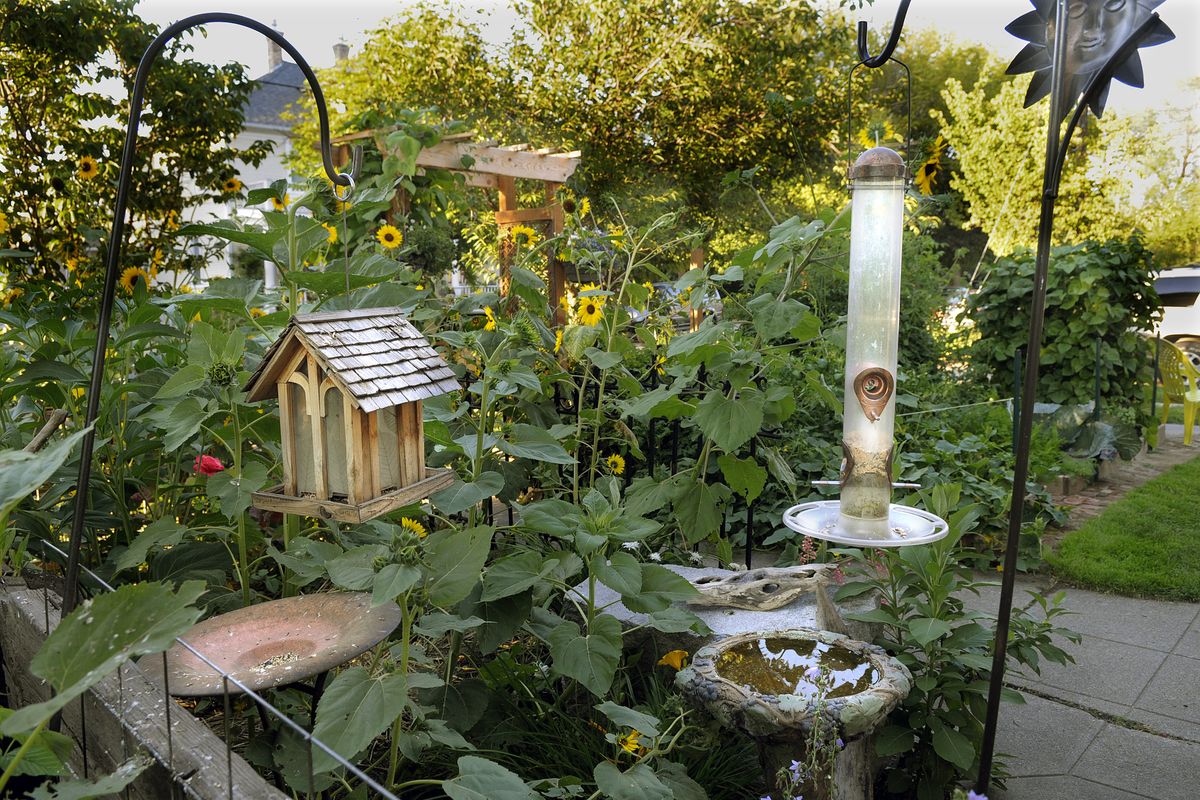Front becomes the new back
Gardening enthusiasts convert front yards into massive gardens

There is a quiet revolution going on across the country these days, and it appears to have hit the Inland Northwest: Homeowners are tearing out their front lawns and growing vegetable gardens instead.
Take Pat and Lisa Coleman. These residents of the Peaceful Valley neighborhood west of downtown Spokane have packed every square inch of their front yard with vegetables.
Birds flock to the feeders and birdbaths, and bright sunflowers greet passersby with their cheery golden faces. A “Garden for Victory” banner presides over the scene from the upper story of their home.
In this welcoming garden, every plant is healthy and robust. The Colemans are growing berries, herbs and vegetables – potatoes, beans, zucchini, pumpkins, cucumbers, peppers, carrots, tomatoes, cabbage, beets and asparagus – in raised beds.
They started planning in March and got an early start in April when the weather was nice.
“Pat had been an organic gardener on Green Bluff,” Lisa Coleman says of her husband, “and I have a green thumb. We pooled our skills and resources and it all came together. We approached it as a grand experiment.”
Lisa Coleman learned how to garden from both of her grandmothers.
“We went to their gardens in Oregon when I was growing up,” she explains. “My parents are fantastic gardeners and my daughters garden, too, so we have four generations of gardeners in my family.”
She says she would definitely recommend creating a front-yard vegetable garden to others.
“Our garden has helped us meet our neighbors and make friends. We plan to expand our front porch so neighbors can visit,” she says.
“To be able to go outside and pick your food is great. The cost was minimal because we grew nearly everything from seed. It has served our purpose of building community.”
In Spokane’s North Hill neighborhood, Geoff Loftin and partner Val Neilson were inspired by the book “Food Not Lawns” by Heather Flores (Chelsea Green, 344 pages, $25).
“We were sick of tending the lawn,” Loftin explains. “We removed the sod and brought in compost. Then I used a broadfork to break up the soil while being careful not to destroy the soil structure. We formed the soil into raised beds and made the pathways.”
While this was Loftin’s first gardening experience, Neilson has been an avid gardener for many years.
“I grew up in the country and my grandma and mom had a huge garden,” she says. “But this was my first garden where I started everything from seed. We also compost everything.”
In addition to growing berries, fruit trees and rhubarb, their vegetables include broccoli, potatoes, tomatoes, peppers, winter squash, cucumbers, amaranth, summer squash, beans, corn and sunflowers.
“This is so much more rewarding than having a lawn,” Neilson says. “Harvesting the garden is like Christmas. I’m anxious to see how cheaply we can eat.”
“We love sitting outside to eat our meals that have been prepared with fresh vegetables from the garden,” adds Loftin.
In northwest Spokane, Robert Fischbach is also growing vegetables in his front yard.
“You won’t find a speck of grass here,” he says. “When I was a teenager, I mowed 70 lawns a week so I knew I didn’t want to do that anymore.”
Fischbach is growing peppers, zucchini and pumpkins out front and more vegetables in the backyard.
“The best part is we have food to eat throughout the summer,” he says. “At the end of the season, I just turn the water off and am done for the year.”
Northwest Spokane resident Jan Baker and her neighbors Grant and Carole Deeble have also turned most of their front lawns into vegetable gardens that are growing in raised beds.
Baker says she and her partner are environmentally conscious and “realized that our lawn was just a waste of water and resources.”
Having grown up during World War II, she recalls how her family grew everything they needed and were self-sufficient.
Baker is growing pole beans, peas, peppers, tomatoes, herbs and strawberries.
“I would definitely encourage young families to try growing their own food,” she says. “Get rid of the grass.”
The Deebles also have enjoyed their raised beds of tomatoes, lettuce, cucumbers, basil and pole beans and have been encouraging their neighbors to give it a try.
“I enjoy the fun of watching the garden grow and picking our own fresh produce,” Carole Deeble says.
Perhaps the most famous couple growing a vegetable garden in their front yard this year are President Barack Obama and first lady Michelle Obama.
The White House Organic Farm Project is being used to educate children about where food comes from, and the produce will be used for state dinners and be donated to local food pantries.
But most importantly, it should inspire Americans to reconnect with the land and grow healthy produce for their families.